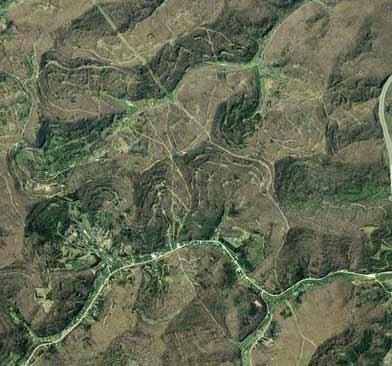 |
This image is an aerial photograph in which can be seen roads to oil wells in an old oil field near Newton in Clay County, West Virginia.
|
|
II. Who is harmed by the Rule of Capture,
and who would be helped by well spacing and royalty sharing?
Almost everyone’s interest is harmed if, because of the Rule of Capture, more wells than are necessary are drilled to drain the pool gas.
The mineral owners, who get paid a royalty, will collectively get less royalty money, because less total gas will be drained out of the pool and sold than if the proper number of gas wells were used. Also a mineral owner of a large tract of land can be harmed when an imprudent lessee/driller drills two wells so far apart that an area in between will not be drained by either well, but so close that the space in between is not worth drillling a third well to drain -- "spacing out" and wasting the area in between."
The investors who financed the drilling of the well by the “operator” (usually the “lessee” from the mineral owner) will get less return on their money for the same reason.
It costs $250,000.00 or more to drill a shallow gas well, plus continuing operating expenses. So if credence is given to the economic theory that the costs of doing business are always passed on to the consumer, then the cost of drilling the extra wells will be added to the consumer’s gas bill.
Every time a well is drilled down through the water table and other rock strata to get to the gas bearing strata, there is some risk of pollution of that shallower strata, plus the risk of some pollution on the surface.
Every extra well means some surface owner gets an unnecessary well site and access road imposed on him or her!
Requiring forced well spacing and royalty sharing for all wells would be complicated and politically difficult. This is explained in more detail later. But it would be fairer to all. It is best for almost everyone involved, for the mineral owners, the surface owners, the investors, the environment, and, in the long term, for operators as a class. It is a fairer and a more economically efficient way of producing resources that are not confined to boundaries of the individual driller’s or mineral owner’s property (or rights).
|
